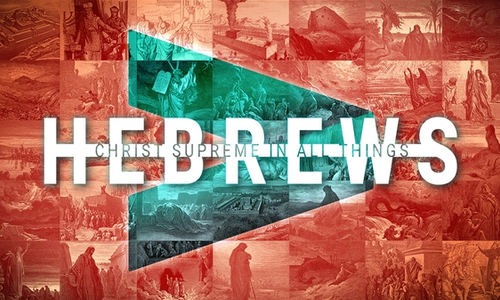Sunday Service 9am & 11am
Wednesday Service 7pm
(210) 920-6502
551 E Nakoma St.
San Antonio, TX 78216
Join a small group to study this sermon with like-minded believers.
Hebrews Intro
LISTEN. STUDY. APPLY
Video
Audio
Footnotes
Manuscript
Today we begin a new series together in the book of Hebrews. So if you would, go ahead and turn to that book with me. Hebrews is found in the NT after the thirteen letters of Paul, and before the letters of James, Peter, John, and Jude. It is the ninth from the last book in the NT.
In terms of size (word count), Hebrews is the thirty first largest book out of sixty-six books. The only books that are longer than Hebrews in the NT are Matthew, Mark, Luke, John, Acts, Romans, and 1 Corinthians. So this is a lengthier book in the NT, but it’s only about a quarter of the size of the longest book in the NT, Luke.
You might say, “That’s great, Pastor Tony. Thanks for the facts. But what is Hebrews about? What is the emphasis of this book?” Well this book is about Jesus. I’ve tried to capture that in the series title: “Christ Supreme in All Things.”
I heard a story once about a pastor who had just gotten hired out of seminary. And his head was so full of Greek and Hebrew and philosophy and theology, that he was raring to go. And he was wearing his congregation out every week with facts and with exegesis and with cultural background. And one Sunday he came up to his pulpit, and there was a little sticky note that simply read, “John 12:21.” And he went home and looked it up and the passage read, “So these came to Philip, who was from Bethsaida in Galilee, and asked him, ‘Sir, we wish to see Jesus.’”
And so, even with that passage quoted a little out of context, the pastor got the point. The church needed to see Jesus. So he kept at it with his exegesis, theology, and all the rest, but he was more conscientious from that point forward about showcasing what’s called the metanarrative of Scripture, that is the central message of redemption through Christ Jesus. And sure enough a few weeks later he went to the pulpit and there was another note and it read, “John 20:20.” And that passage read, “Then the disciples were glad when they saw the Lord [Jesus].”
Now I’m going to give you some facts this morning. We’re going to talk about Hebrews. We’re going to talk about who wrote it, to whom was it written, why it was written, etc. And we’re going to study this book for the next year, and we are going to get into some fascinating discussions about Melchizedek and the OT sacrificial system and the OT priesthood and the wilderness wandering of the Israelites, etc. From my vantage point all of this stuff is incredibly fascinating. I love this book of Hebrews. It's one of my favorite books in the Bible, and probably my favorite book in the NT. But let’s not lose our bearings as we study this book together. This book, the inspired word of God, is ultimately about Jesus Christ. It was written so that we might know Christ better and love him more deeply.
Tell me if you’ve heard this before: “‘The Word of God’ (the Scripture) bears witness to the ‘WORD of God’ (Jesus Christ).” Jesus said as much when he rebuked the Pharisees in the book of John. He said,
“You pore over the Scriptures because you presume that by them you possess eternal life. These are the very words that testify about Me” (John 5:39).
“‘The Word of God’ (the Scripture) bears witness to the ‘WORD of God’ (Jesus Christ).” I can’t think of a book that better exemplifies that than the book of Hebrews. And my prayer for us as a church is that by the time we are done studying this book, we will have a ridiculously deeper love and appreciation for our Savior, Jesus Christ than we do right now. You’re not going to be the same person after we are done studying this book in a year’s time. Your view of Jesus will be immeasurably deepened at the end of this study. That’s my prayer.
So here we go. Here’s your outline for today. Let me introduce this amazing book. Let’s answer four questions this morning: 1) Who, 2) When, 3) Where, and 4) Why. Let’s start with the first question: Who.
1) Who wrote the book of Hebrews?
Well let’s start with what we know. We know that the Holy Spirit co-wrote this book.
The Holy Spirit
As evangelicals, we believe in what’s called the dual authorship of Scripture. We believe that the Bible is the Word of God, and that these words in Hebrews and the other Scriptures were “God-breathed.” We believe that “All Scripture is breathed out by God and profitable for teaching, for reproof, for correction, and for training in righteousness, that the man of God may be complete, equipped for every good work” (2 Tim 3:16-17). We believe that the book of Hebrews like all prophecy of Scripture was not “produced by the will of man, but men spoke from God as they were carried along by the Holy Spirit” (2 Pet 1:21). And it’s important to acknowledge this, because Hebrews wasn’t just written for its original audience, whoever that was, it was also written by the Holy Spirit, for our church in San Antonio.
Now as for the human author of this book. Here’s the reality of what we are dealing with. We just don’t know who that is.
An unknown human author
And that’s curious because we know pretty much all the rest of the authors of the NT. Paul explicitly references himself in his letters, as does Jude, James, and Peter. Even the “anonymous” letters of Matthew, Mark, Luke, and John are pretty well established in church history as the apostles Matthew, Mark, Luke, and John. But Hebrews is a mystery.
Let me just give you a few possible options for authorship. Please don’t die on a hill for any of these theories. Some of the early Greek manuscripts actually packaged Hebrews with the other thirteen letters of Paul. And this gave rise to the theory in the early church that Paul wrote this book. That’s possible. The early church historian Eusebius (AD 260-340) referred to Paul’s fourteen epistles which included Hebrews right after Romans. Also in Hebrews 13:23 the author writes, “You should know that our brother Timothy has been released, with whom I shall see you if he comes soon.” Who was more closely associated with Timothy in the NT?
Others who hold to this view include the church fathers Augustine (AD 354-430) and Jerome (c. AD 342-420), the protestant reformer Huldrych Zwingli (AD 1484-1531), the puritan John Owen (AD 1616-1683), and even some modern-day advocates.
Nevertheless there are good reasons to discount the Pauline authorship theory. The language of Hebrews is very different from Paul. And in all thirteen of Paul’s epistles, he explicitly identifies himself as the author. Why not in Hebrews if he truly wrote this book?
Another popular theory regarding authorship involves Barnabas, Paul close associate on his first missionary journey (Acts 13-14). This view was first put forth by the church father Tertullian (AD 155-220). This is possible, because Barnabas was a Jew. And he was even a Levite, which may explain why there is so much about priests and priestly sacrifices in Hebrews. Also Barnabas is called the “son of encouragement” … in fact Barnabas means “son of encouragement” (Act 4:36). The Greek word for encouragement is παράκλησις, and at the end of Hebrews the author says, “I appeal to you, brothers, bear with my word of exhortation [παράκλησις], for I have written to you briefly” (Heb 13:22). The problem with this view is that παράκλησις is a very common word in the NT, so there’s no reason to see this as a secret clue that Barnabas is the author.
Other possible authors that have been put forth include Clement of Rome, Silas, Philip, Steven, Epaphras, Priscilla, Jude, Luke, and even Mary, the mother of Jesus. The only one of these that has been given serious consideration is Luke, who is known already to have written two books of the NT (Luke and Acts). But I personally doubt that Luke had the kind of detailed knowledge of the Hebrew OT sacrificial system. Maybe he did? Or maybe he took detailed notes from Paul and wrote this himself? Some church fathers like Clement of Alexandria (AD 150-215) even thought that Paul wrote Hebrews in the Hebrew language, and then Luke translated it into Greek. All of this is pure conjecture.
And as long as we are conjecturing, here’s my best guess as to who wrote the book of Hebrews. I think, along with Martin Luther and the modern Hebrews scholar, George Guthrie, that the best candidate is Apollos. He was a Jew. He was converted to Christianity by Priscilla and Aquilla. He knew Paul, and therefore would have been acquainted with Timothy. He was “competent in the Scriptures” (Acts 18:24). And he “powerfully refuted the Jews in public, showing by the Scriptures that the Christ was Jesus” (Acts 18:28). Would I die on a hill for that theory? No. Does it make a huge difference in our interpretation of this book? Not really. I don’t think so. The important thing for us to keep in mind is that a human author wrote this book and was inspired by the Holy Spirit in doing so. Therefore it is authoritative and powerful for us as Christians. Or as the author of Hebrews said it (Apollos or Paul or whoever it was): “The word of God is living and active, sharper than any two-edged sword, piercing to the division of soul and of spirit, of joints and of marrow, and discerning the thoughts and intentions of the heart” (4:12).
Now since we don’t know (fully) the answer to the first question, the answer to the next question is even more difficult to answer.
2) When did the author write this book?
I’m going to say…
Approximately AD 60-70
In fact, I’ll say it a little more definitively. I think this book was written shortly…
Before the destruction of the Temple
The technical term for this is terminus ad quem. The latest possible date for this book is AD 70, which is when the Temple of Jerusalem was destroyed. Why would this book need to be written before the temple was destroyed? Well because the author writes about temple sacrifices and temple activities in the present tense. For example Hebrews 9:25 says, “Nor was it to offer himself repeatedly, as the high priest enters the holy places every year with blood not his own.” The word “enters” there is a present tense verb of the Greek εἰσέρχομαι. Likewise Hebrews 13:11 says, “For the bodies of those animals whose blood is brought into the holy places by the high priest as a sacrifice for sin are burned outside the camp.” The word “brought” there is a present passive tense of Greek εἰσφέρω. And the author writes about the temple as a viable option for those Jewish converts to Christianity who he is writing to!
So if the terminus ad quem is AD 70, what is the terminus a quo? In other words, what’s the earliest possible date for this book? Well that’s harder to establish, but I’m inclined to see this book as written later than Paul’s letters and after a significant number of the Jewish diaspora throughout the Roman Empire had been converted to Christianity.
Also the author of Hebrews talks extensively about the persecution of Christians throughout the empire. Well the persecution of Jews and Christians was widespread throughout the first century, but it was especially intense during the reign of Emperor Nero in the late AD 60s. Nero (probably) was responsible for putting both Peter and Paul to death. He burned down Rome in AD 64 and blamed the Christians for it. He would also use Christians to light up his gardens. He would crucify them, and then put pitch on them, and set them on fire to light up his gardens. That timeframe, the late AD 60s is the ideal time for a book like Hebrews to be written.
Some have even narrowed the date further to between AD 68-70. And that’s because of that statement about Timothy leaving prison in Hebrews 13:23. If Timothy was imprisoned during the reign of Nero, but then released when Nero died in AD 68, then possibly the book was written between AD 68 and the destruction of the Temple in AD 70. This makes good sense, but of course it’s impossible to be dogmatic on this matter.
So if those first two questions are difficult to answer, this third question is well-nigh impossible to answer.
3) Where was it written and to whom was it written?
Well let me take a stab at this. The answer to that first question has to be…
From an unknown location
We just don’t know. And the author doesn’t tell us. But we do have this statement in Hebrews about a group of Italians. The author writes, “Greet all your leaders and all the saints. Those who come from Italy send you greetings” (13:24). I’ll just tell you, that verse is incredibly intriguing. Does that mean that there are a group of Italians with the author who are located together outside of Italy? Maybe in Jerusalem? Or does that mean that the author is in Italy with a group of Italians writing to people outside of Italy? I don’t know. I wish I did. But the sentence is ambiguous. Probably we are dealing with an author who is not in Italy, who is writing to a group of people in Italy and sending greetings to them from Italians who are no longer in Italy.
Now the second part of that question is easier to answer—to whom was it written? Based upon the kinds of things that the author writes, we are dealing with an audience that is “a group of Hellenized Jewish Christians (possibly in Rome?) who were tempted to abandon their faith.”
To a group of Hellenized Jewish Christians (in Rome?) who were tempted to abandon their faith
Let me take this statement apart for you. “Hellenized” simply means Greek-speaking and Greek-cultured. I say Hellenized and Jewish, because this audience was clearly Jewish and clearly Greek speaking. Every time this author quotes an OT passage, he quotes out of the Greek Septuagint. And his Greek is extremely polished and sophisticated—way more sophisticated than Paul! And yet there is a Jewish emphasis on the OT throughout this book.
By the way, the title of the book is Hebrews. But that title is not part of the text itself. You won’t find that in the book anywhere. That was the title given to the book by the early church, and it makes sense because the book has such a Jewish focus. And that’s kind of confusing to us, because we have a book called Hebrews written in Greek to Greek-speaking Jewish Christians. That would make perfect sense in the first century world, but that’s confusing to us.
Now I think there’s a good possibility that this letter was written to Rome, because Rome had a huge population of Jews at this time. George Guthrie writes this in his commentary: “By the mid-first century A.D. the city of Rome would boast a population of over one million and lead an empire spanning continents. Living among its citizens were between forty and sixty thousand Jews, whose community had formed a significant segment of Roman society for over one hundred years.”
And the way the gospel spread throughout the Roman world was quite amazing. There was this event called Pentecost in Acts 2. And you had all of these diaspora Jews who had come to Jerusalem for Pentecost. But while they were there, the Apostle Peter preached the gospel and some of them got saved. The Holy Spirit actually empowered the disciples to speak in foreign tongues, and Luke writes, “And they were amazed and astonished, saying, ‘Are not all these who are speaking Galileans? And how is it that we hear, each of us in his own native language? Parthians and Medes and Elamites and residents of Mesopotamia, Judea and Cappadocia, Pontus and Asia, Phrygia and Pamphylia, Egypt and the parts of Libya belonging to Cyrene, and visitors from Rome, both Jews and proselytes, Cretans and Arabians—we hear them telling in our own tongues the mighty works of God” (Acts 2:7-11). And so after Pentecost, the Jews went back to their homes as saved followers of Jesus and started sharing the gospel.
That’s why there was this church that emerged in Rome that Paul wrote to, even though he had never been to Rome before!
Well lots of Hellenized Jews in Rome and elsewhere gave their life to Christ, and that was initially amazing and wonderful. But eventually they started getting persecuted. And not only were they persecuted because of their Jewish identity, they were also persecuted because of their Jewish Christian identity. It was a double whammy! And as you read this book, you get the sense that some of them were deconverting. They were going back to their Jewish roots. They were rediscovering their Jewishness, and the text of the OT, and instead of seeing those events as precursors to Christ, they were seeing them as superior to Christ. And like Israelites in the wilderness who were hankering for the leeks and onions of Egypt (Num 11:4-6), they started to hanker for their pre-Christian lives.
And so part of the argument of Hebrews is this: Christ is better. The author is saying, “Christ is superior to all that OT imagery. In fact, that OT imagery is fulfilled in him! So stay the course my Jewish, Christian brothers.”
Now a lot of times as you are reading this book, you’re going to feel like you are reading someone else’s mail. And that’s because we are a room full of Gentiles here reading a book written by a Christian Jew telling other Jewish Christians not to revert back to their pre-Christian state. But keep in mind, that this book isn’t just written by a Jewish Christian, this book is written by the Holy Spirit. And it has been preserved for our edification.
And let me just draw a line of application between them and us. Part of the author’s argument in this book is that de-conversion is stupid! Those are my words, not his. I’m paraphrasing. De-conversion is stupid, because Christ is so much better than anything else in this world. Can I just say that that’ll preach in our modern-day world? I promise you before we’re done with this series on Hebrews, you will here me say at least one more time de-conversion is stupid. Because Christ is so much better than anything this world has to offer.
And I say that with a heavy heart, because we live in a day where people that I’ve admired, and even close friends of mine have “de-converted.” And of course the world thinks that’s so brave. And the world thinks that’s so heroic. I don’t think that’s brave. I think it’s shameful. And I think it’s silly, because where do you run to after you de-convert? Are the things of this world better than Jesus Christ? I don’t think so!
So I think this book was written to a group of Hellenized Jewish Christians (in Rome?) who were tempted to abandon their faith. But this book was also written to a group of Gentile Christians in San Antonio, Texas, who are being pressured by the world to abandon their faith, and the Holy Spirit is telling them,
“Don’t you do it! Jesus is better than anything this world has to offer. Don’t you listen to the world. Don’t you abandon your faith!” Christ is supreme in all things!
So, last question. Why.
4) Why was this book written?
We’ve already touched on this but let me just summarize with two final statements. Why was this book written? Two reasons. First…
To emphasize the supremacy of Christ
And then secondly, and this second reason is bound up with the first reason…
To encourage a group of Jewish Christians to persevere in faith
We’ve already talk about how the author wants to encourage a group of Jewish Christians to persevere in their faith. That’s a big part of why this author sat down and wrote this book. But what’s interesting to me is not just why he does this, but how he does this. He doesn’t beg them to stay in the faith. He doesn’t Mr. Rogers them. “Please and pretty please won’t you be a Christian.” The author avoids any and all kinds of that obsequiousness. Instead he does two things. He warns them. There are a lot of warnings in this passage. And some of them will make the hair at the back of your head stand up. I mean some of these warnings are going to theologically perplex the lot of us, and I think they were intended to do that.
So he warns them. But he also does something else. He tells them of the glorious supremacy of Jesus Christ. Listen, according to the book of Hebrews, Jesus is just better. He just is. He’s better than the prophets, he’s better than the angels, and he’s better than Moses. He’s better than Joshua, he’s better than Aaron, he’s better than the OT priesthood, and he’s better than sacrifices offered by the OT priesthood. He makes us sure of better things, introducing a better hope, mediating for us a better covenant, with better blood speaking a better word. He provides us a better covenant, a better country, and a better life. Christ is just better than anything this world has to offer, including the good things of the OT. He just is.
By the way that word “better” in Greek is κρείττων, and it’s used fifteen times in the NT. Twelve of those fifteen occurrences are in the book of Hebrews. That’s a point of emphasis for this author. Jesus is better. He’s superior.
And that begins right off the bat in chapter 1. He writes in verse 1:
1 Long ago, at many times and in many ways, God spoke to our fathers by the prophets, 2 but in these last days he has spoken to us by his Son, whom he appointed the heir of all things, through whom also he created the world. 3 He is the radiance of the glory of God and the exact imprint of his nature, and he upholds the universe by the word of his power. After making purification for sins, he sat down at the right hand of the Majesty on high, 4 having become as much superior [κρείττων] to angels as the name he has inherited is more excellent than theirs.
That word for “better,” the Greek κρείττων is a point of emphasis as soon as the book begins, as the author talks about the superiority of Jesus over the angels. More on that next week. I would even argue that it starts before that in verse 1, where the author says that the Son is superior to the prophets.
1 Long ago, at many times and in many ways, God spoke to our fathers by the prophets, 2 but in these last days he has spoken to us by his Son,
That’s this author’s way of saying what Jesus said in John. “These are the Scriptures that testify to me” (5:39). Al Mohler says in his commentary on Hebrews that “The Old Testament is a story in need of a conclusion—a messianic conclusion.” Jesus is that messianic conclusion according to Hebrews. The Word of the Prophets is superseded by the W-O-R-D of God (the logos of John 1), the Son.
1 Long ago, at many times and in many ways, God spoke to our fathers by the prophets, 2 but in these last days he has spoken to us by his Son,
“What in the world does that mean, Pastor Tony? Help me understand that.” I will. I will wrestle that to the ground for you… I promise… next week!
I’ll close with this. Some of you, I’m sure, remember from the Chronicles of Narnia, the great Christ figure, a lion named Aslan. Well, there’s a moment in C.S. Lewis’s Prince Caspian where the heroine of that story, Lucy, meets up with Aslan. And “In a burst of emotion Lucy rushed to him, burying her face in the rich silkiness of his mane, whereupon the great beast rolled over on his side so that Lucy fell, half-sitting and half-lying between his front paws. He bent forward and touched her nose with his tongue. His warm breath was all around her. She gazed up into the large, wise face.”
“Welcome, child,” he said.
“Aslan,” said Lucy, “you’re bigger.”
“That is because you are older, little one,” answered he.
“Not because you are?”
“I am not. But every year you grow, you will find me bigger.”
You know what my goal is for us, church? You know what I want for us each week that we study this great book of the Bible? My goal is that we will find Christ bigger. My goal is that we will find Jesus better. My goal is that we would embrace the supremacy of Christ in all things. Pray with me towards that end.

Taught by Tony Caffey
Senior Pastor of Verse By Verse Fellowship
Hebrews Series
LATEST SERMONS
BROWSE THE LATEST SERMONS








